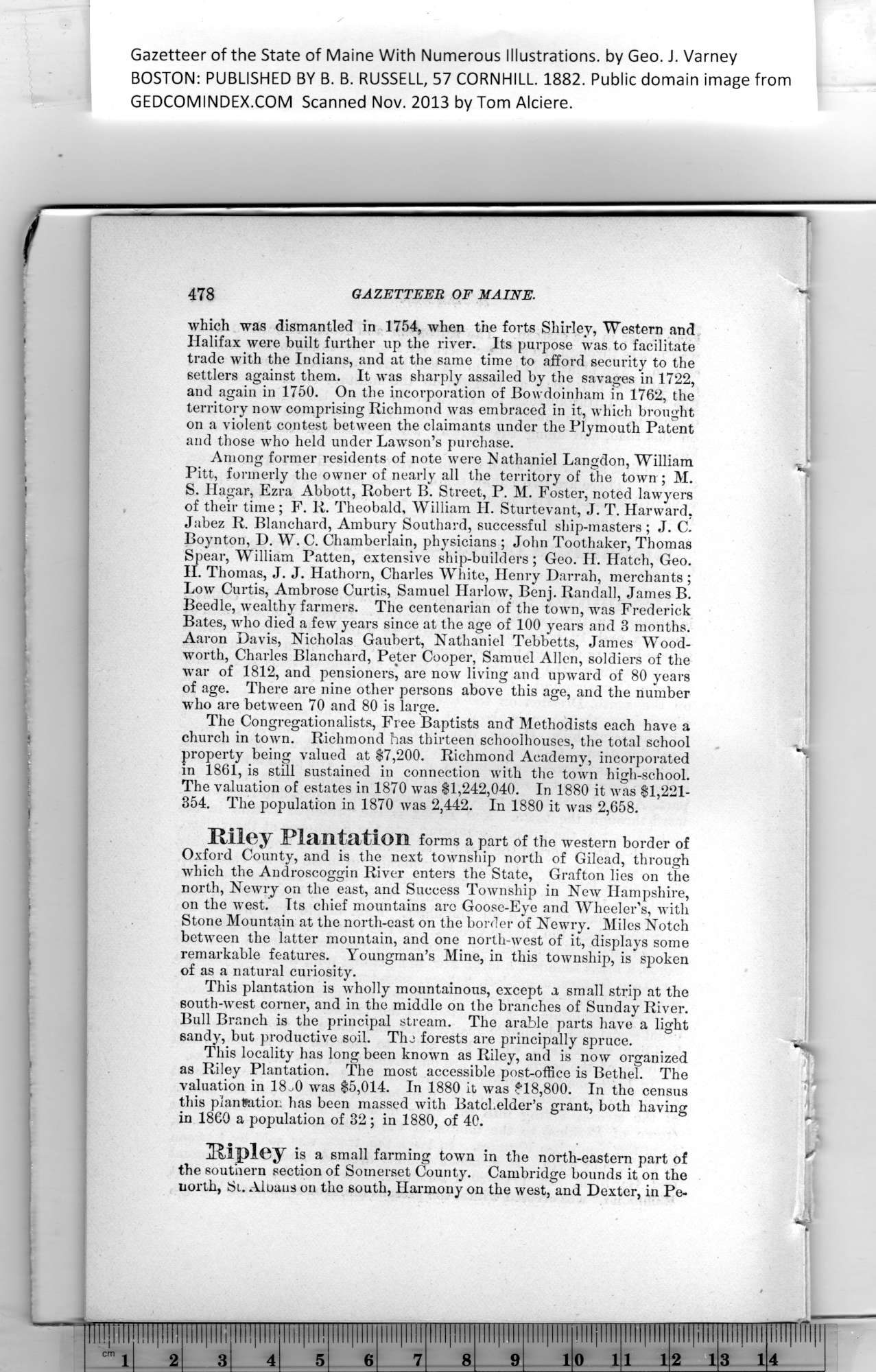|
Gazetteer of the State of Maine With Numerous Illustrations, by Geo. J. Varney
BOSTON: PUBLISHED BY B. B. RUSSELL, 57 CORNHILL. 1882. Public domain image from
478 GAZETTEER OF MAINE.
which was dismantled in 1754, when the forts Shirley, Western and
Halifax were built further up the river. Its purpose was to facilitate
trade with the Indians, and at the same time to afford security to the
settlers against them. It was sharply assailed by the savages in 1722,
and again in 1750. On the incorporation of Bowdoinham in 1762, the
territory now comprising Richmond was embraced in it, which brought
on a violent contest between the claimants under the Plymouth Patent
and those who held under Lawson’s purchase.
Among former residents of note were Nathaniel Langdon, William
Pitt, formerly the owner of nearly all the territory of the town ; M.
S. IIagar, Ezra Abbott, Robert B. Street, P. M. Foster, noted lawyers
of their time ; F. R. Theobald, William II. Sturtevant, J. T. Harward,
Jabez R. Blanchard, Ambury Southard, successful sbip-masters ; J. C.
Boynton, D. W. C. Chamberlain, physicians ; John Toothaker, Thomas
Spear, William Patten, extensive ship-builders; Geo. H. Hatch, Geo.
H. Thomas, J. J. Hathorn, Charles White, Henry Darrah, merchants ;
Low Curtis, Ambrose Curtis, Samuel Harlow, Benj. Randall, James B.
Beedle, wealthy farmers. The centenarian of the town, was Frederick
Bates, who died a few years since at the age of 100 years and 3 months.
Aaron Davis, Nicholas Gaubert, Nathaniel Tebbetts, James Wood-
worth, Charles Blanchard, Peter Cooper, Samuel Allen, soldiers of the
war of 1812, and pensioners! are now living and upward of 80 years
of age. There are nine other persons above this age, and the number
who are between 70 and 80 is large.
The Congregationalists, Free Baptists and Methodists each have a
church in town. Richmond has thirteen schoolhouses, the total school
property being valued at $7,200. Richmond Academy, incorporated
in 1861, is still sustained in connection with the town high-school.
The valuation of estates in 1870 was $1,242,040. In 1880 it was $1,221-
354. The population in 1870 was 2,442. In 1880 it was 2,658.
ILlloy IPiRH'tR'tlOn forms a part of the western border of
Oxford County, and is the next township north of Gilead, through
which the Androscoggin River enters the State, Grafton lies on the
north, Newry on the east, and Success Township in New Hampshire,
on the west." Tts chief mountains are Goose-Eye and Wheeler’s, with
Stone Mountain at the north-east on the border of Newry. Miles Notch
between tbe latter mountain, and one north-west of it, displays some
remarkable features. Youngman’s Mine, in this township, is spoken
of as a natural curiosity.
This plantation is wholly mountainous, except a small strip at the
south-west corner, and in the middle on the branches of Sunday River.
Bull Branch is the principal stream. The arable parts have a light
sandy, but productive soil. The forests are principally spruce.
This locality has long been known as Riley, and is now organized
as Riley Plantation. The most accessible post-office is Bethel. The
valuation in 18^0 was $5,014. In 1880 it was $18,800. In the census
this plantation has been massed with BatcLelder’s grant, both having
in 1860 a population of 32 ; in 1880, of 40.
Hipley is a small farming town in the north-eastern part of
the southern section of Somerset County. Cambridge bounds it on the
uorth, Si. Aloaus on the south, Harmony on the west, and Dexter, in Pe-
PREVIOUS PAGE ... NEXT PAGE
This page was written in HTML using a program written in Python 3.2
|
